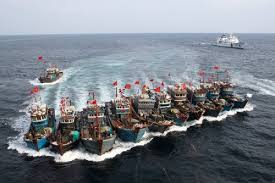
In recent months, South Korea has intensified its efforts to combat illegal fishing by Chinese vessels near its western islands. The situation has escalated, prompting the South Korean government to take decisive action. Illegal fishing threatens local fisheries and poses a risk to the marine ecosystem.
Recently, South Korean authorities seized two Chinese fishing boats near the five islands of the West Sea. Each weighing 50 tons, these vessels were apprehended using high-speed patrol boats and helicopters. The operation showcased South Korea’s commitment to protecting its waters. However, the success could have been improved. Despite the robust response, only two boats were captured. This was due to the evasive tactics employed by the Chinese fishermen.
These fishermen often use various methods to evade capture. They quickly change their routes or group together in a line, with crews retreating to the next boat and cutting loose the boarded vessel. This makes it challenging for the South Korean authorities to enforce the law effectively. As a result, many illegal vessels continue to operate without fear of repercussions.
The recent seizures highlight a growing issue. The number of illegal Chinese fishing boats in South Korean waters is increasing. In 2023 alone, South Korean authorities seized 74 Chinese vessels. This alarming trend threatens the sustainability of local fish stocks, which Fishermen in South Korea depend on for their livelihoods. As illegal fishing continues, the competition for resources intensifies.
Local fishers have expressed their concerns. Many report seeing more Chinese boats in the area. They worry about the long-term impact on fish populations. Fish stocks are already under pressure due to overfishing, climate change, and pollution. The added strain from illegal fishing could prove disastrous.
Illegal fishing has significant consequences for South Korean fisheries. As Chinese boats continue to operate in these waters, local fishermen don’t catch enough fish. This leads to economic hardship for many families and raises questions about food security in the region. Fish is a staple in the South Korean diet, and diminishing stocks could affect prices and availability.
The government has begun responding, implementing stricter regulations and increasing patrols. However, the challenges remain formidable. The vastness of the ocean makes it difficult to monitor all illegal activities. Furthermore, the tactics used by the Chinese boats complicate enforcement efforts.
This issue is not new. Tensions over fishing rights have existed for years in the region. The West Sea, also known as the Yellow Sea, is rich in marine resources. As a result, it attracts fishermen from various countries. However, the competition for these resources often leads to disputes. South Korea has long claimed these waters as part of its exclusive economic zone.
In addition to the economic implications, geopolitical factors are at play. South Korea’s relationship with China is complex. While both countries engage in trade and diplomacy, issues like illegal fishing can strain these ties. The South Korean government must balance economic interests with national security concerns.
Looking ahead, the South Korean government is investing in better technology. Advanced surveillance systems can help track illegal vessels more effectively. Drones and satellite imagery may also play a crucial role in monitoring activities in the West Sea. These technologies can provide real-time data, allowing authorities to respond more quickly.
As the government implements new strategies and strengthens international cooperation, the hope is to restore balance in the West Sea. Protecting marine resources is vital not only for the economy but also for the environment. The fight against illegal fishing is far from over, but with continued efforts, South Korea can progress in safeguarding its waters.




